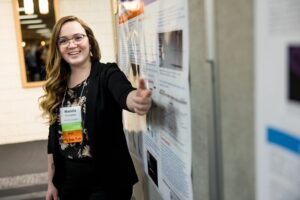
Maddie Summers is a fourth-year Health Studies major. As part of the Ralph Jones Fellowship, Summers has been working with biology Professor Juliette Tinker researching toxins and vaccines as part of her Ralph Jones Fellowship.
Read on to learn more about Summers and her research!
What kind of project are you working on with Dr. Tinker?
We have been looking into AB5 toxins, protein complexes secreted by bacteria, as potential components of vaccines. I have specifically looked at two AB5 toxins: artAB from Salmonella and heat-labile toxin (LT) from E. coli.
I used bioinformatics to determine the prevalence of the artB gene in Salmonella from different hosts, and the homology of this gene to other known toxins. These studies will also increase our understanding of how these toxins contribute to infection and pathogenesis.
What is the main role you have been given as a fellow in Dr. Tinker’s lab?
I have been working on two projects for Dr. Tinker. The first project is with Salmonella, where I have been purifying artAB and artB for use in downstream activity assays, such as ADP-ribosylation. I have also done some bioinformatics on Salmonella to determine the prevalence and homology of artB in different hosts (cows, chickens, and pigs).
The second project is with E.coli, where I first cloned the heat-labile toxin (LT) into E.coli then purified the LT proteins for further investigation.
What interests you most about this research project?
I thought it was really interesting to learn about how toxins can be used as components of vaccines as well as help with the early vaccine development stages. There is very little known about the toxin artAB and so it was really intriguing to see how this toxin compares to ones we already know more about so we could potentially use it in a bovine vaccine for Salmonella.
When did you first know you wanted to study health and medicine?
I grew up with a dad in the military, so I was exposed to many different environments and cultures. From the ages of seven through eleven, I lived on the island of Guam, which has a significant amount of poverty, and as a result, access to healthcare is challenging for many individuals. At such a young age, I was confused as to why families there were forced to live with diseases and illnesses that my family didn’t, and I didn’t understand why they were unable to go to a doctor whenever they were sick to get the treatments that they needed.
These questions began my drive to go into the medical field and become a doctor. I gained a passion for research to better answer the questions that I had, but more importantly it gave me a strong desire to serve rural and underserved populations.
What are some of the skills you learned in this research experience that you’re excited to take into a future career?
Through this experience, there was a lot of trial and error, thus requiring lots of patience. We were having difficulties with purifying some of these proteins in the lab, so we did a lot of troubleshooting. This taught me that research does not always go as planned and how to take a step back in an attempt to find a solution. I look forward to taking these skills of perseverance, patience, problem solving and critical thinking into my future career.
What advice would you give to other students thinking about applying to the Ralph Jones Fellowship?
Even if you think you won’t be accepted or think you don’t know enough to do research, still apply! I had no research experience and was very nervous to work in Dr. Tinker’s lab, as I had very little experience in her field.
Dr. Tinker has been a great mentor and has helped me through this whole experience. I went into this summer with zero experience and very little confidence, but I am leaving with a whole new skill set and a new passion for research!
Has working on this research project changed your view of the medical field in any way?
Yes! Before this fellowship, I never really considered working in the research aspect of medicine. However, after this summer in Dr. Tinker’s lab and attending both the Idaho Conference on Undergraduate Research and the IDeA Network of Biomedical Research Excellence, I have found that it is something I really enjoy.
In my future career as a physician, I hope to keep my curiosity and continue to conduct research.
What was your favorite takeaway from this fellowship?
This fellowship has allowed me to experience a different side of medicine than what I am used to, has increased my curiosity and has created a new passion for research. I have been able to make some amazing connections and learn some new and very valuable skills for my future in medicine.
While this fellowship will help a lot with medical school, I have found it is so much more than that. Research is a very important aspect of medicine and I am so grateful for this opportunity to be exposed to it. I am also beyond grateful to Dr. Ralph Jones’ family for making all of this possible!
Learn more about the Ralph Jones Pre-Medical Summer Research Fellowship.